 Petzlover
Petzlover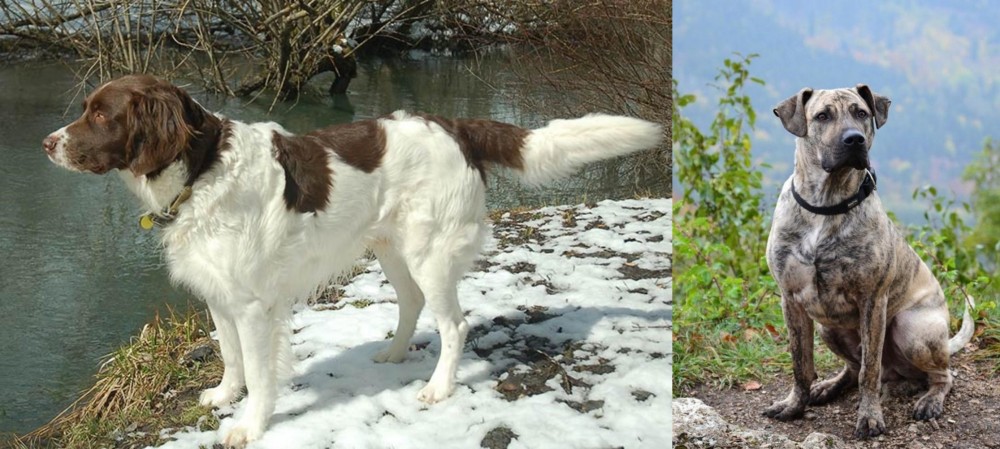 Drentse Patrijshond is originated from Netherlands but Perro Cimarron is originated from Uruguay. Both Drentse Patrijshond and Perro Cimarron are having almost same height. Drentse Patrijshond may weigh 15 kg / 33 pounds lesser than Perro Cimarron. Both Drentse Patrijshond and Perro Cimarron has almost same life span. Drentse Patrijshond may have less litter size than Perro Cimarron. Drentse Patrijshond requires Moderate Maintenance. But Perro Cimarron requires Low Maintenance
Drentse Patrijshond is originated from Netherlands but Perro Cimarron is originated from Uruguay. Both Drentse Patrijshond and Perro Cimarron are having almost same height. Drentse Patrijshond may weigh 15 kg / 33 pounds lesser than Perro Cimarron. Both Drentse Patrijshond and Perro Cimarron has almost same life span. Drentse Patrijshond may have less litter size than Perro Cimarron. Drentse Patrijshond requires Moderate Maintenance. But Perro Cimarron requires Low Maintenance
 The Drentse Patrijshond came about in the 1930-1950s. The breed developed from pointing dogs which originated in Spain, arriving in the Netherlands in the 16th century and being known as Partridge dogs.
The Drentse Patrijshond came about in the 1930-1950s. The breed developed from pointing dogs which originated in Spain, arriving in the Netherlands in the 16th century and being known as Partridge dogs.
The eastern part was known as the Province of Drenthe, and it is this area where these Partridge dogs were bred exclusively, not being mixed with other unknown breeds.
After World War II the Drentse Patrijshond was also recognized by the FCI. It was a popular dog in the Netherlands and the breed was also recognized by the Dutch Kennel Club in 1943. The Dretse’s popularity grew in other European countries too. In the 1960s some of the dogs entered the United States and in 2008 the Drentse Patrijshond Club of North America was established.
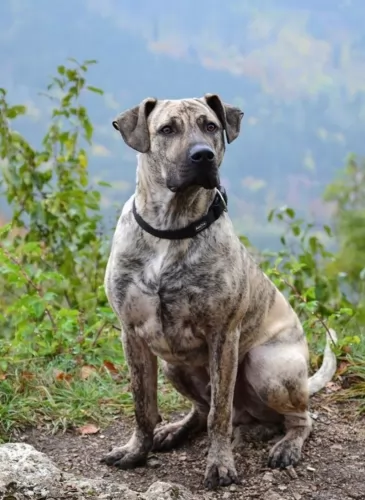 The Perro Cimarron, also known as the Uruguayan Cimarron is a molosser type dog which originated in Uruguay. The dog is believed to have descending from European dogs which were brought to the country by early colonizers.
The Perro Cimarron, also known as the Uruguayan Cimarron is a molosser type dog which originated in Uruguay. The dog is believed to have descending from European dogs which were brought to the country by early colonizers.
These dogs are the official mascot of the National Army of Uruguay. The dog is also recognized in Uruguay as well as by the Federation Cynologique Internationale. The dog was exported to the United States and then recognized by the United Kennel Club in the category Guardian Dog.
 The Drentse Patrijshond is a medium to large sized dog standing between 55 and 63cm in height and weighing anything between 18 and 30kg. He is a working dog and known by other names such as Dutch Partridge Dog and Dutch Gundog among others.
The Drentse Patrijshond is a medium to large sized dog standing between 55 and 63cm in height and weighing anything between 18 and 30kg. He is a working dog and known by other names such as Dutch Partridge Dog and Dutch Gundog among others.
The coat of the dog is medium length and dense and is mostly white with reddish brown markings. People looking at him liken him to a spaniel, pointer or setter kind of dog. He is athletic and muscular with a long feathery tail, floppy ears and a brown nose with amber colored eyes.
The Drentsche Patrijshond is an amicable family dog who is relaxed and calm around other pets in the home as well as children. In fact it is the kind of dog that forms a strong bond with his human family, not liking to be left alone.
He is a lively, alert and playful dog with a tendency to be a bit stubborn but this is easily dealt with when he undergoes training and socialization. He is an adaptable dog, being able to fit into life in the city or the countryside, just so long as his beloved owners are close by. However, he is very active and will require an owner who will take time out to take him on walks or involve him in lots of outdoor activities.
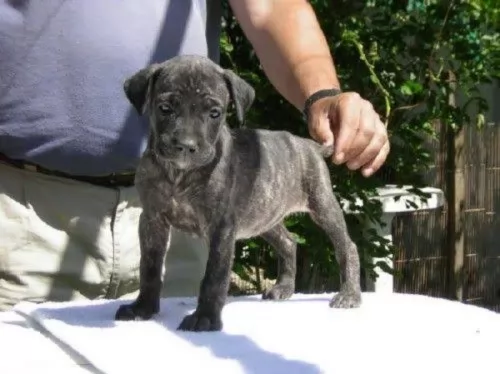 The Perro Cimarron is a large dog standing at between 58 to 61cm and weighing 38 to 45kg, both males and females.
The Perro Cimarron is a large dog standing at between 58 to 61cm and weighing 38 to 45kg, both males and females.
He is a muscular dog with the coat being short and smooth and in a pale fawnish color or brindle and with a black face.
The Uruguayan Cimarron is a multi-purpose working dog but today he is mainly a family companion. This large mastiff type dog is muscular and athletic. He has a large head, the ears are high set and floppy but sometimes they are still cropped and made erect. The tail is thick, low set and reaches to the hock. He has a black nose, brown eyes and a black mask.
Strong, alert, self confident and brave, the Perro Cimarron may not have a particularly friendly face but he loves his human family and is loyal to them. He is calm and cool but even so, he will need to be trained and socialized and then he becomes calm around different people and in different situations. He is a dog that can get on well with children and pets in the home.
 The Drentse Patrijshond is a breed of dog that is particularly human orientated – just loving being around his human family.
The Drentse Patrijshond is a breed of dog that is particularly human orientated – just loving being around his human family.
He forms a deep bond with those that care for him and he can’t bear to be separated from his human family. The dog has always had a strong hunting instinct but these days this sweet, loyal dog is much more a devoted family pet who is more than happy to come indoors and make himself at home among his family members.
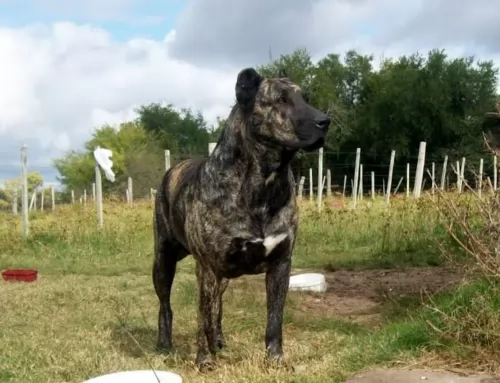 The Uruguayan Cimarron is not looked upon as a pet for the first time dog owner. He is strong willed, stubborn, somewhat aggressive and independent and will require a strong, firm, consistent owner.
The Uruguayan Cimarron is not looked upon as a pet for the first time dog owner. He is strong willed, stubborn, somewhat aggressive and independent and will require a strong, firm, consistent owner.
He will make a loyal, affectionate pet for the person who takes time to socialize and train him. He also makes a good watchdog.
The way any dog breed is brought up will determine how he turns out, and if this particular dog is brought up the right way and given the right amount of care and exercise he needs, he can make as good a pet as any other dog breed.
 The Drentse is a fairly healthy dog breed, with a life span of 12 to 15 years. No matter how healthy your dog, there will always be some health issues it may face. Environmental factors and diet can play an important part in his wellbeing.
The Drentse is a fairly healthy dog breed, with a life span of 12 to 15 years. No matter how healthy your dog, there will always be some health issues it may face. Environmental factors and diet can play an important part in his wellbeing.
Health concerns with this breed can include progressive retinal atrophy, hip dysplasia as well as hereditary stomatocytosis. This is a disorder that affects the dog’s cells walls.
Too much fluid gets into the cells and this damages red blood cells. Some breeds are more prone to this disorder, and the Drentse Patrijshond is one. It is an hereditary disorder that results in chronic anemia and liver disease.
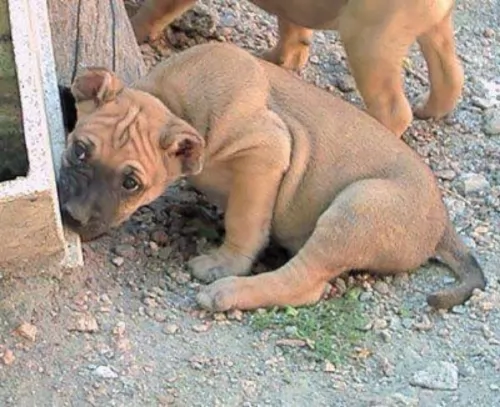 Most dogs, when they are well cared for, don’t get sick often. The Cimarrón is a robust kind of dog but even so he can get any one of the many common dog illnesses there are such as hip dysplasia, bloat, dental disease, cancer, obesity and others.
Most dogs, when they are well cared for, don’t get sick often. The Cimarrón is a robust kind of dog but even so he can get any one of the many common dog illnesses there are such as hip dysplasia, bloat, dental disease, cancer, obesity and others.
This infection can make your dog restless and you will notice your dog trying to wee often but unable to. It can be terrible watching your dog battling, and you will need to get your pet to the vet soon.
Your dog can pick up parasites anywhere such as ticks ad fleas. There are also internal parasites such as tape- and heartworms. They can bring your pet down, making him lethargic and nauseous, so it is best to research canine parasites so you can know what steps to take to protect your dog.
Don’t for one minute think that skin problems are a minor ailment. The pain and itching can drive your dog to despair. The skin can be red, inflamed and oozing. There are so many things that can cause your pet to get a skin allergy and you will need to get him to the vet to get some kind of relief for him.
 This dog is quite a heavy shedder, but even so, he won’t need professional grooming – just a good brushing twice a week.
This dog is quite a heavy shedder, but even so, he won’t need professional grooming – just a good brushing twice a week.
The teeth will need to be brushed 2 or 3x a week and because he has floppy ears, these will need to be checked for infection. It’s a good idea to clean them with some special dog ear cleanser, but if you’re not sure how, your vet or a professional groomer can do it for you.
Cut your dog’ nails, but once again if you think you might cut into the quick of the nail, causing bleeding and pain, a professional groomer can do it for you.
The Drentsche Patrijshond will require quality dry dog food. Speak to your vet about the best kibble that ensures your pet gets his full quota of vitamins and minerals. Add in cooked brown rice, vegetables and chicken from time to time and include some raw meat wherever possible. Adding in some raw meat helps to stave off dry, red, irritated skin. Your pet will also need access to fresh, cool water day and night.
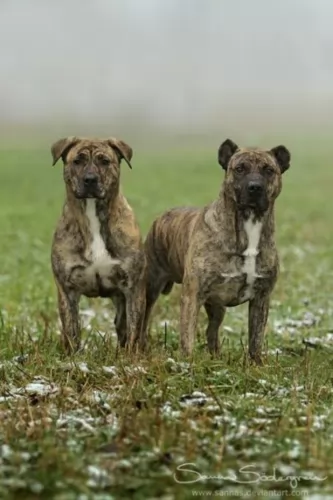 As a high energy, intelligent dog, the Cimarron Uruguayo needs plenty of exercise. He won’t be content to sit around and will be frustrated and even destructive if he doesn’t receive lots of attention and exercise. Daily walks will be imperative as well as other forms of physical and mental stimulation.
As a high energy, intelligent dog, the Cimarron Uruguayo needs plenty of exercise. He won’t be content to sit around and will be frustrated and even destructive if he doesn’t receive lots of attention and exercise. Daily walks will be imperative as well as other forms of physical and mental stimulation.
Your Uruguayan Cimarron is a low maintenance dog because of the short coat which will still require brushing twice a week as he does shed quite a bit. Other forms of grooming include nail clipping, checking the ears and teeth as both of these can become seriously infected if not checked and attended to.
If you have a Uruguayan Cimarron dog as a pet, you will need to be looking at the best food for him as he is large and energetic. There are some excellent commercially manufactured dog foods on the market and you want to be sure that you read the ingredients list so that the food can benefit your pet.
It’s never a good idea to just go on and on feeding your pet kibble. A break every now and again can do your pet the world of good. Some home-made food such as boiled chicken, brown rice or pasta and some cooked vegetables such as sweet potato, carrots and spinach will delight your dog when added into his kibble occasionally. He loves the tasty simplicity of such a diet and will never have to worry about digestive problems.
For such a dog, some raw meat added in from time to time will also do him good. Make sure he always has access to fresh, cool water.